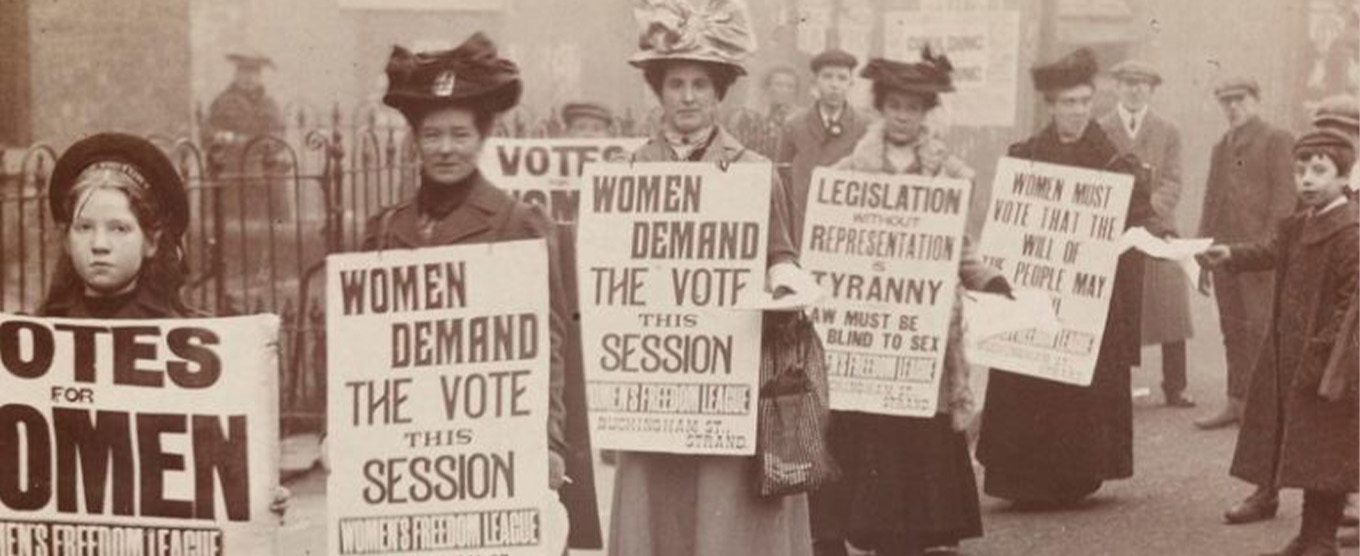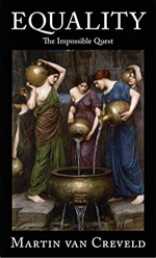Editor’s Note: I’ve discussed gender politics and issues at length in past blog entries. Our newest writer on the team, Alexander Shaw, doesn’t quite agree with me.
I have a confession to make. I am slightly aroused by the concept of a woman casting her vote. Playfully, furtively, or even passionately, she takes a blank ballot slip into the intimate privacy of the booth and strokes, strikes or spoils those empty boxes. No such inclination could exist, of course, if it weren’t obvious that for a woman to vote is a disorder. A pleasurable disorder, perhaps, but – like a risqué hemline at the altar rail – a disorder nonetheless.
Where women are emancipated, societies are wealthier. This correlation is touted without much discussion as to why it might be the case. It is easier to point out that feminine intuition and temperance stabilise society than to consider that only initially wealthy societies can afford empathy in their judicial processes and compassion in the hunt.
Biological restraints have caused the sexes to evolve distinct social behavioral patterns. A village that loses the majority of its men is obviously easier to repopulate than if it loses even a few of its women. Hedging one’s life in order to tame nature was a gamble that men could more readily make and it follows that, when pushed, societies have sacrificed male lives to preserve female lives. Most men who have ever lived have no living descendent today. Most women do. The competitive and often dangerous means by which we supplied ourselves, however, could not be employed in the nurture of dependent children. It was thus equally important to our survival that hard-won resources be distributed according to collective needs rather than individual merit. Men focused on the means, women enforced the ends.
Discerning value in abstract ideas necessarily involves an adversarial process that carries at least a mild risk of ostracisation. If those opposed to a plan can nevertheless claim credit for the ends achieved, nothing has been learned. Existentially, it is only worth a man having convictions if they disagree with those around him. For the consensus operators of home and hearth, however, an agreement is a social end in itself and ostracisation carries a higher risk with a lower possibility of returns. A meritocracy of ideas must, if anything, be suppressed.
Lo and behold, modern behavioral studies conclude that women are less disagreeable than men. In extremis, what is conventionally true must trump what is actually true for women whereas for men it is exactly the other way round.

These differences get confusing when a society develops levels of administrative complexity that enables its own abstract values to be transferred into material value. For instance, is a trader in fiat currencies ultimately a producer or an administrator? What about Victorian mill owners who employed hundreds of workers – often women and children – whose industrial risks made the administrative classes wealthy? Inevitably, people ask, if the sexes are stepping up to each others’ responsibilities, shouldn’t they also be given each others’ privileges?
To this end, social constructs that ignore human differences have become very important.
This has does a great disservice to women who ‘cross the line’ and speak out against the orthodoxies of their society – they are braver than men who do the same.
It also precludes basic explanations as to why girls are more vulnerable to depression as a result of peer pressure and beauty standards on social media than are boys, and why they are more likely to report ‘suicidal thoughts’ while boys are more likely to actually kill themselves.
We manipulate behavior to fit what we imagine to be true of our nature, devising novel pathologies and prescribing mind-altering drugs to produce approximately the results required of the blank-slate narrative. From an early age, girls are enjoined to moxie and sass, while boys are medicated to calm down, be obedient, and fall in line.
At its extreme, this outlook has ushered in complete denial of sexual dimorphism – but that is a red herring. What is demographically significant is that, behind the facade, men and women still assess value differently.
Recognizing the potential for commodity value in abstract ideas remains very much the game of men. There are no female bitcoin millionaires, for instance, because bitcoin had no societal endorsement until it was already ‘working.’ By the same token, there are also fewer female bankrupts than men. Despite the casualties, however, a disproportionate bulk of any society’s wealth is normally generated by a minority of its men and we can surmise from the evolutionary experience that it was generally better for women to attach themselves to those men than to attempt to become accountable for those risky decisions themselves.

Where women march through the civic institutions, however, so follows their fear of conflict. The ‘Overton Window’ (that scope of discussion which is socially permissible), narrows. Accountability is spread out across innumerable departments and committees and eventually status is only possible in any corner of society through self-censorship which narrows the parameters of permissible thought; thence possible thought; thence productive capacity. Put simply, if a theory or idea can be promoted or quashed for the whole society simply by recourse to whether it is generally acceptable or not – the feminine social imperative has constricted the masculine social imperative.
It’s not a matter of ‘left and right’ (men would have turned France Communist in 1946), but of inhibition in seeking measures proportional to one’s own perception of circumstances leading to an inability to do so. The Universal Suffrage project has reached this stage. Most individuals’ convictions are now irrelevant at the ballot box because the predominant political parties in nearly every late-stage democracy are distinguished only by a narcissism of small differences for appearances’ sake. Voting has become more a token of a civic concern than a means of affecting change.
Where a maverick is elected it is usually the male vote which tips the balance.
But the civil institutions (universities, media syndicates and so forth), stand ready to correct the result and oust a leader that they find unacceptable.
The modern shift towards soft totalitarianism needs to be recognized as essentially a feminine imperative which has rendered the vote worthless in nearly every society that employs universal suffrage. It may be true that women hinder relative extremism, but we are no more protected from actual extremism than were the early pioneers of universal suffrage: the USSR and Weimar Germany. In the end, such societies will only enable you to vote for one thing: more handouts and preservation of stability until bust.
Worse than losing ballot-democracy, however, is having to observe the conventional lies and constraints of day-to-day public discourse. These lead to confusion as to the very source of the society’s wealth in the first place, as well as to self-righteous fury in compliant men when – despite all they are told – nature ends up selecting the bad-boys for breeding. (As an aside – China’s slightly Orwellian ‘social credit rating system’ is doomed to failure for this very reason).

To acknowledge that men vote for means and women for ends would delegitimize the hundred-year universal suffrage experiment. If this hypothesis won’t be proven in discourse, then it will be bourn out amid the realization that the vote is finally powerless to affect governance for anyone. This particular type of democracy will collapse, leaving in its wake several competing theories of its demise. Happily, order will re-emerge regardless of whether we take the lesson.
Human ecology is cleverer than the high-minded ideals by which we seek to conquer it. Civic power will return, as it does, to a cadre of cronies and oligarchs who will at least maintain enough general order to protect their own interests. Moreover, without the excess wealth that enabled us to indulge in fanciful social experiments, the bloated administrative sector will run out of steam and erstwhile pencil-pushers shall be respected for taking the well-calculated risks of providership. Thus we shall return to production.
I assume there are no women still reading at this point, so I say to you now: the collapse is coming and it’s more than your job’s worth to resist it.
More blog entries about gender politics, both on and off the battlefield.

A comparison between the blockbuster film Wonder Woman and the lesser known Russian war flick Battalion.

The enemy’s ultimate goal is to destroy women. If they succeed in their nefarious objective, society itself will collapse.
Alita is fun and beautifully filmed, well worth seeing. Feminists’ reviews were savage. Here’s why.
Recommended Reading
In the kingdoms of the West, something is rotten. They have lost almost every conflict abroad since the Korean War. What went wrong? Judging from the topic of this article; guess.
All over the Western world gaps between rich and poor are widening-or the headlines say. There has been a continuous call to produce a more equal society. But what is equality?
Throughout history, women have been shielded from the heat of battle. Now all that has changed. But, do they actually belong there? This historian answers with a hard “no.”

Alexander Shaw is one of the founding authors of the Reading Junkie Blog writing team. As a Brit, he brings a fresh perspective to us Yanks.
In addition to contributing to the Reading Junkie blog, Alex plans to publish a book (but is being coy about it and won’t tell us busybodies what it’s going to be about). In the meanwhile, enjoy his content, follow him on his profile and subscribe to the newsletter!
For any questions, ideas, or partnerships you would like to discuss with him, reach out on the social media platforms below, or email alexanderfrancisshaw@gmail.com
All About Alexander’s Projects












I urge the author to engage in deeper study of human evolution, evolutionary psychology, and history. The ideas presented in this essay reflect a perfunctory grasp of what is known about sexual relationships. For example, sexual dimorphism has a great deal more to do with female submissiveness than represented here. Male risk-taking is not a manifestation of self-sacrificial nobility; it is a selfish attempt to garner greater access to female reproductive capacity. Female attraction to wealth is a pragmatic response to the male proclivity to abandon females after copulation.
A good example of the author’s misconceptions appears in this statement:
“…nature ends up selecting the bad-boys for breeding.”
Actually, nature doesn’t select males; females do. Their selection is based on many factors, but we may forgivably reduce them to three primary factors: apparently favorable genes (an example of this is the symmetry of the face); ability to provide sustenance for offspring (wealth); and apparent integrity (the reliability of the promise to provide sustenance for offspring).
Finally, the author’s silly predictions for the future of governance only serve to discredit his understanding of history. It is true that democracy is losing its efficacy, but his claim that society will revert to ancient systems reflects a failure to grasp the fact that society has changed radically.
I urge upon the author the truism that “It’s ALWAYS more complicated than you realize.”
I urge the author to engage in deeper study of human evolution, evolutionary psychology, and history. The ideas presented in this essay reflect a perfunctory grasp of what is known about sexual relationships. For example, sexual dimorphism has a great deal more to do with female submissiveness than represented here. Male risk-taking is not a manifestation of self-sacrificial nobility; it is a selfish attempt to garner greater access to female reproductive capacity. Female attraction to wealth is a pragmatic response to the male proclivity to abandon females after copulation. A good example of the author's misconceptions appears in this statement: "…nature ends up selecting the bad-boys for breeding." Actually, nature doesn't select males; females do. Their selection is based on many factors, but we may forgivably reduce them to three primary factors: apparently favorable genes (an example of this is the symmetry of the face); ability to provide sustenance for offspring (wealth); and apparent integrity (the reliability of the promise to provide sustenance for offspring). Finally, the author's silly predictions for the future of governance only serve to discredit his understanding of history. It is true that democracy is losing its efficacy, but his claim that society will revert to ancient systems reflects a failure to grasp the fact that society has changed radically. I urge upon the author the truism that "It's ALWAYS more complicated than you realize."
Chris – females are nature, a part of. Core elements of basic human nature will not be altered by governance, no matter its sophistication or complication. In fact, that ever-increasing sophistication/complication may well cause the collapse/implosion of that same governance. We all play the game in this experience, but our human nature is bound by its designer, a design that we all will revert when pressed hard enough. And in the end, it is all only a game.
You’re absolutely right that males and females have fundamental psychological differences. What neither you nor the author have done is present an iota of evidence that these psychological differences have any bearing on their fitness for voting. What I read here is uninformed prejudice, not rational analysis. I urge you to take the time to study gender psychology in general and evolutionary psychology in particular.
Chris – females are nature, a part of. Core elements of basic human nature will not be altered by governance, no matter its sophistication or complication. In fact, that ever-increasing sophistication/complication may well cause the collapse/implosion of that same governance. We all play the game in this experience, but our human nature is bound by its designer, a design that we all will revert when pressed hard enough. And in the end, it is all only a game.
This page definitely has all of the info I needed concerning this subject and didn’t know who to ask.
Feel free to surf to my blog post … bussy888
This page definitely has all of the info I needed concerning this subject and didn't know who to ask. Feel free to surf to my blog post … <a href="https://freeholmes.com/forum/viewtopic.php?id=154108" rel="nofollow ugc">bussy888</a>
You're absolutely right that males and females have fundamental psychological differences. What neither you nor the author have done is present an iota of evidence that these psychological differences have any bearing on their fitness for voting. What I read here is uninformed prejudice, not rational analysis. I urge you to take the time to study gender psychology in general and evolutionary psychology in particular.